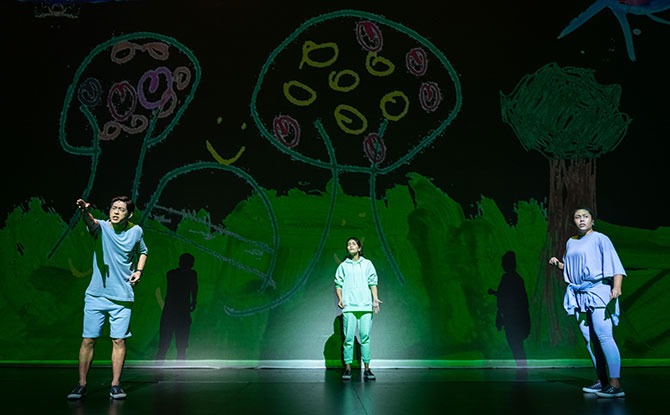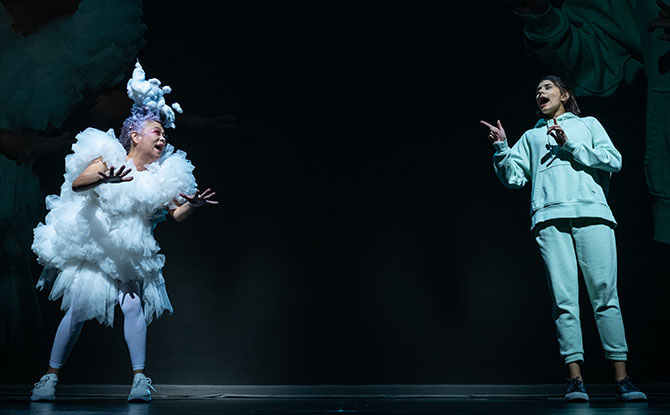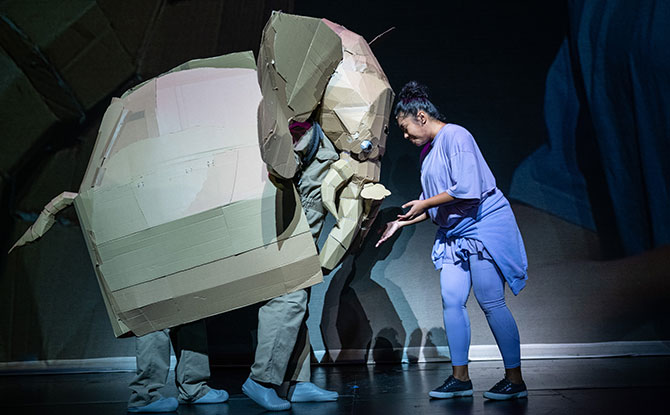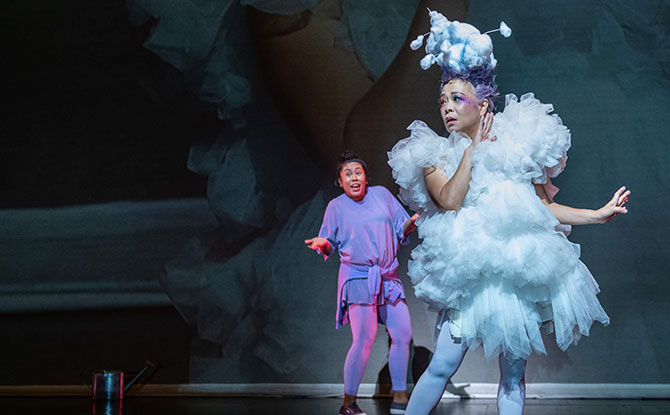
It was our first arts-related outing since COVID-19 broke and it felt good to be back! Social distancing measures didn’t dampen the magic of the theatre, which was ably delivered by The Feelings Farm as part of Esplanade – Theatre on the Bay’s new annual children’s festival March On.
A Trip to The Feelings Farm
Somewhat reminiscent of the 2015 Pixar film Inside Out, The Feelings Farm tackles the weighty topic of emotions – particularly how big they can seem to little ones – in the familiarity of the Singapore context.

As the lights dimmed we were thrust into the world of young Kai (Ryan Ang), Mira (Shafiqhah Efandi) and Shan (Mehr Dudeja) who, on a field trip in Kranji, stumble across the magical Feelings Farm. They embark on a journey through different feelings with the mysterious Cloud (Pam Oei) as their guide.

As the back story of the children unfolds, they are led through such memorably-named landscapes as the Longkang of Loneliness, the Swamp of Sadness and the Web of Worry, and encounter characters like the Ants of Anger, the Jellyfish of Jealousy and – my young viewer’s favourite – the Elephant of Embarrassment. Along the way they learn to recognise, name and navigate the feelings within themselves.
FREE FOR LITTLE DAY OUT PARENTS: Sign Up for a Free Trial with ACT 3 Academy to Find Out If Drama Classes are Right for Your Child
3 Recycling Adventures: Fun Ideas For Kids & Families
1:1 & Small Group English Lessons: How to Get Personalised, English Help
The children are given handles on how to recognise their feelings. Anger, for example is likened to a hot, itchy feeling on the skin, and Sadness to having your feet stuck deep in mud.
In acknowledgement of the complexity of feelings, the children learn that some emotions may hide under others – loneliness beneath anger, for example.

There is no map of the Feelings Farm, Cloud tells the children, because each person’s journey on the Farm is different. As are individual expressions of emotions. Kai draws while Mira dances when they have no words to articulate their feelings.
Every Feeling Has a Job To Do

Playwright Amanda Chong sensitively encourages children to face their feelings, however uncomfortable they may be, and to work through them.
“Every feeling has a job to do, even the ones we don’t like. If a feeling shows up, it is because it has something to tell us,” Cloud tells a Mira who is refusing to acknowledge her embarrassment.

Elsewhere, Shan and Mira are encouraged to stay in the Swamp of Sadness, rather than run from it, because it is only when they work through the emotion, that they’ll be able to help Kai who’s stuck there.
Perhaps one of the most reassuring messages to children is that feelings will not last forever, even though it may seem so in the moment. In the words of the theme song:
“Nothing lasts forever
Though sometimes it might seem so.
Whatever happens here,
Remember feelings come and go”
Exploring Feelings In Multiple Ways

The physical set of The Feelings Farm may have been minimalistic, but director Edith Podesta’s exploration of the subject matter was anything but. Music, movement, poetry and multimedia were used in combination to give flesh to the various emotions.
Scenes that continue to linger with me include the visual portrayal of fears towering over Kai, a hauntingly moving scene when the children waltz – on stage and on screen – with their loneliness, and the imagery of the fragile paper boats that Mira and Shan pilot over the Swamp of Sadness to reach Kai.
A strong performance by the inimitable Pam Oei anchored the production, and added a welcome dose of humour to some otherwise heavy scenes. But from the opening bars, the other star of the show for me was composer Julian Wong’s music, under the musical direction of Joel Nah, which was both lyrical and thoughtful. Long after we left the theatre, I heard my son happily humming the theme song.
Behind the Scenes and Post-Show
There were two pleasant bonuses to our outing – a video clip that gave us a behind-the-scenes peek into the making of The Feelings Farm, which involved children in six Social Service Agencies being invited to participate in a series of workshops that informed the artists’ processes and decisions.
The other was a free resource guide on feelings for families and children to use post show.
A Timely and Timeless Message for Young and Old

Amidst this pandemic, increasing attention is being drawn to its impact on our mental wellbeing. The messages of The Feelings Farm are timely, not only for children but their caregivers too, because it is so easy for adults to dismiss or minimise children’s feelings.
My little one was on the younger end of the recommended viewer age of 6 and up. I felt that the richness of the production would have been even better appreciated by his older 9 and 12 year old siblings.
The Feelings Farm carries a timeless message – that it is in understanding and accepting our own emotions, that we are better able to show compassion to others in theirs. In this respect The Feelings Farm feels like an important piece of local children’s theatre.
Find out more about The Feelings Farm and Esplanade Presents March On.

















